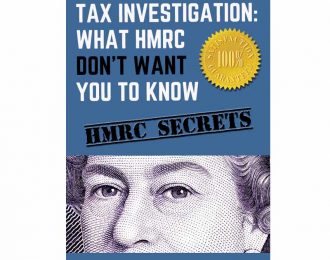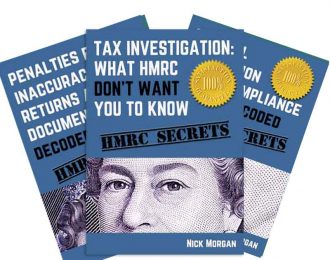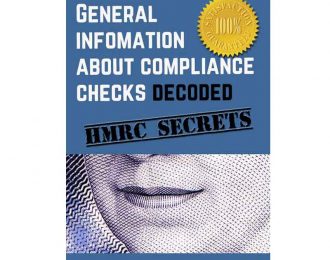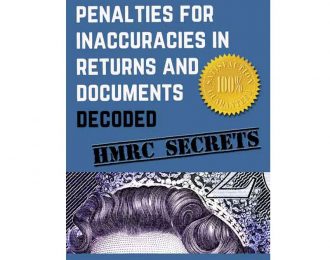Early Questions
What is a HMRC tax investigation? Why was I picked? What sort of investigation is this? What does HMRC know about me? How long will this go on? You’ve got questions, let’s get some answers.

WHAT IS A HMRC TAX INVESTIGATION?
HMRC call tax investigations complacence checks. A compliance check can be anything from a five-minute phone call (to sort out an obvious arithmetical mistake) to a major investigation into a sizeable company’s fraudulent activities – and everything in-between. So it is an investigation into your tax return.
This concise and informative answer comes from the ebook General Information about Compliance Checks Decoded which is available in the shop.

WHY WAS I PICKED?
How an individual is picked for investigation is a closely guarded secret.
When we look at globally who is picked for investigation there is a disproportionate leaning towards ‘low value’ cases – so that’s the first surprise.
The second thing we know is that HMRC are very much into high tech ‘predictive analytics’.
Connect, run by Capgemini is HMRC’s strategic risking tool that, in Capgemini’s own words, “Cross-matches one billion internal and third party data items to uncover hidden relationships across organisations, customers and their associated data links, such as bank interest, lifestyle indicators and stated tax liability. It captures information from 28 different data sources, and transforms the data into a standard format for Connect analytical and ‘spider diagram’ visualisation tools.”
So what might Connect’s algorithm be set for? Data protection requests suggest that HMRC are looking at these questions about you:
Have you made a loss? A loss will mean no tax and not paying tax is suspicious – how do you live if you don’t make much cash?
Are your expenses high? High expenses may indicate you are being less than honest about what is a business expense.
Has your turnover fallen? Lower than anticipated turnover could be a sign that some of your income is no longer going through the books and – perhaps – is being stuffed under the mattress or put into an illicit account.
Are your means low? A low income raises the question, how do you survive on no cash or low cash? If your lifestyle is good – you have three holidays a year and take helicopter lessons – how can you survive on under £10k?
Is this a new return? HMRC may think those starting out are more likely to bend the rules or make mistakes.
Are you employed as well as self-employed? There is a belief in HMRC that if you are employed and you’ve also got a side line where you are self-employment your records might not be as robust as somebody who is just self-employed.
So that’s the high tech end.
HMRC are also very interested in old-fashioned ‘grassing up’ – that’s generally angry ex-wives (and ex-husbands) with axes to grind and former financial managers who have been treated badly and want revenge. Without doubt HMRC take tips from this kind of source very seriously.
Then there are the historic methods; HMRC have always had a great deal of data to work with from employers and financial organisations.
Do you get a large amount of interest? Banks report to HMRC on the amounts of interest they give their customers. So if you are on a low income, self employed and yet have interest of £15k a year HMRC will want to know why.
Do you rent out a property through an agent? The agent reports all clients and amounts to HMRC.
Do you work as self employed for a newspaper or a magazine or – in fact any organisation? They are all legally obliged to hand in information about their workers to HMRC.
Here tax director Anne Eager, Tax Director at Robert James Partnership explains why you might have been picked.

WHAT SORT OF INVESTIGATION IS THIS?
Self-assessment investigations normally fall within one of two categories. HMRC often fail to be explicit about which one they are using but it’s import to know from the outset what you are being investigated for.
An aspect enquiry
This – as the title suggests – is an investigation into an aspect of your tax return. If you are subject to an investigation of this sort you need to establish what that aspect is. HMRC should not ask for documents that are not pertinent to this aspect and if they do you can take the case to the Tribunal.
A full enquiry
This is a detailed full investigation.

WHAT DOES HMRC KNOW ABOUT ME?
Quite a bit: if they’ve launched an investigation they have done their homework first.
If you do any work that is linked to your National Insurance number HMRC will know about it.
If you get rental income for a property and you have gone through an agent they will know about that too – letting agents are required by law to inform HMRC of your income.
Bought a property? HMRC have access to the records – and you may have paid the Stamp Duty of course which they will know about. HMRC can also easily find out how much interest you are making in the bank.
They – like anyone – can also look at the electoral roll to see who lives in your home.
At a more extreme level HMRC have the power to get Oyster card details – so they can tell when and where you travel in London -they can also get details of your weekly shop at the supermarket via your loyalty card. Do a bit of DIY that spills over into a business? HMRC can hunt down your B&Q activities, again through your handy loyalty card – this sort of thing only happens in extreme cases.
HMRC know how to use Google and they’ll check Facebook and LinkedIn profiles. If your page has a photograph of you piloting your beloved helicopter in Hawaii and you’ve declared an annual income of £10k HMRC will want to know how you can maintain your lifestyle on a small income.

HOW LONG WILL THIS GO ON?
In past years HMRC have let investigations drag on, not wanting to close a case without a result, but not having enough evidence to bring in a good catch. Their hope was to wear you down into submission. Today there is more pressure on investigators to use their budgets more effectively and get a result quickly; by quickly you are looking at 12 to 16 months.
You may think that by giving HMRC all the documents they ask for promptly you will speed things up, but this is not the case. The more you give them (particularly in an early part of the investigation) the more they will dig and the more they will ask for. If they can find something seriously wrong in your accounts for the year of investigation they can open up other years and they can also look at your personal bank statements.
This is called ‘a discovery’ – once HMRC has made a discovery they have much broader powers: they can legitimately request personal bank and credit card statements.
Let’s say your mother gave you a gift of £20 in a cheque – HMRC will want you to get a copy of her statement with the money going out. Anything that can’t be proved HMRC will say is undeclared income.
If you have good representation they will nip this sort of thing in the bud saying, “All this for a £20 cheque! If you’ve got nothing stronger than that we should take this to the Tribunal and close the case.”
But it’s not so easy to do this if you are unrepresented, HMRC can be very convincing. They frame request like this: ‘I NEED to see this statement.’ rather than, ‘It would be helpful if I could have sight of…’
The more paperwork is generated and the more complex the case becomes the harder it is to tie up all the loose ends and bring it to a close. Also the more time and effort HMRC invest in an investigation the greater the pressure is on them to bring in a significant result.
If you are not represented, consider this tactic: when HMRC request documents you have 30 days to reply. Take 25 and give them what they are asking for – as long as they are entitled to it. After a year tell them, “It’s been a year and you’ve got nothing so close the case.”
If they really have nothing they should close the case. If they don’t, take the case to a Tribunal and ask for a closure notice which HMRC will have to comply with.
Apply for a closure notice here: http://hmctsformfinder.justice.gov.uk/HMCTS/GetForm.do?court_forms_id=3019







